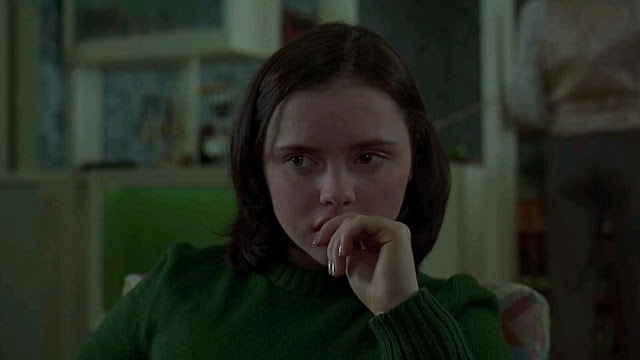The Ice Storm
Ang Lee directs this adaptation of Rick Moody's well received novel of '70s mores, unfolding in New Canaan, Connecticut in 1973. Primarily sexual, as bored adults glumly fall into affairs and mate swapping "key parties". Their children are also experimenting with sex, excited and confused by their budding urges. The Nixon White House forms a backdrop, and figures largely in this story. Only Wendy (Christini Ricci), daughter of Ben (Kevin Kline) and Elena (Joan Allen) and brother of Paul (Tobey Macguire), seems to care about the political climate. She's obsessed with Watergate hearings and even owns a Nixon face mask, which she wears when her neighbor Mikey (Elijah Wood) tries to get into her pants. For that scene alone, one could lose themselves down a rabbit hole of interpretation.
Wendy is perhaps the central character in this mosaic of upper class suburban melancholia. She is certainly the most realized figure in James Schamus' adaptation (I haven't read the novel). She could be viewed as a manipulative little minx, dabbling both with Mikey and his younger brother Sandy (Adam Hann-Hyrd). Is she some sort of sexual liberation symbol? Clearly. She has a social and political consciousness, displayed amusingly during her parents' immediately regretted decision to let her say Thanksgiving Day grace. Is she headed for the same type of adulthood as Mikey's mother Janey (Sigourney Weaver), who gives off an air of disinhibition and is in fact having an affair with Ben? Or will she learn from all the misery she observes? Would she conform to whatever zeitgeist was in fashion? I've always wondered how her character would act in the '80s and beyond.
Lee perfectly realizes this milieu of upward mobility during a specific time. He evokes a highly vivid atmosphere and meticulously frames period detail. But the film is not all wardrobe and artifacts. I imagine he accurately captured the particular ennui and frustration in an era that espoused liberation. The emptiness and lack of communication. Much of that is not unique to the '70, naturally.
The cast are well selected. The younger actors, which includes Katie Homes in her debut, would (mostly) go on to greater fame in the new millenium, while the older actors by then had established similar personas in a gallery of other films that suit Moody's somber tale. And somber it is, straight to that perfect final scene.




Comments